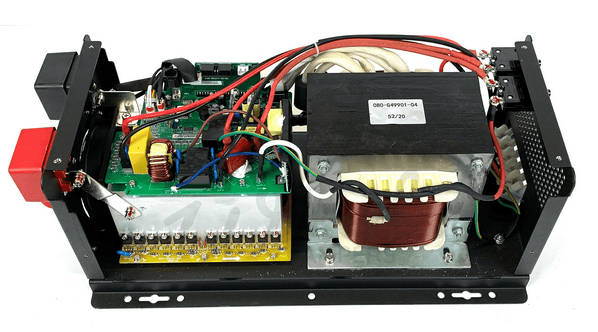The difference between low and high-frequency inverters impacts their weight, efficiency, and applications.
Here’s a brief overview of the two types of off-grid inverters:
Low-Frequency Inverters (lf):
- Weight: Low-frequency inverters are generally heavier than high-frequency inverters, mainly due to their larger and heavier transformers.
- Efficiency: Low-frequency inverters are known for their robustness and ability to handle high surge currents, making them suitable for powering heavy-duty appliances or equipment with high starting currents, such as motors and compressors.
- Applications: These inverters are more suitable for off-grid systems where heavy loads and extreme conditions are expected, such as in industrial applications or in remote locations with harsh environments.

High-Frequency Inverters (hf):
- Weight: High-frequency inverters are lighter than low-frequency inverters, using smaller, lighter transformers.
- Efficiency: High-frequency inverters are generally more efficient than low-frequency inverters for maintaining a constant load for lighter loads. However, they may struggle with high surge currents or heavy loads.
- Applications: These inverters are better suited for off-grid systems with lighter loads and more stable operating conditions, such as residential solar or small-scale off-grid installations.

A high frequency inverter uses mosfets to switch electronically. These mosfets need to be cooled and are attached to heatsinks. In the above picture, you can see the two grey heatsinks, but no big transformer.
The choice between a low-frequency and high-frequency inverter will depend on your specific needs, such as the type of loads you expect to power and the conditions in which your off-grid system will operate. Considering these factors is essential when choosing the suitable inverter for your off-grid solar system.
What frequency inverter does Victron use?
Victron combines both inverters, which they call Hybrid HF or Combined high frequency and line frequency technologies.
What frequency inverter does growatt use?
Growatt uses a high-frequency inverter.
Which one is best? Low or high frequency?
The best inverter is the low-frequency inverter. This is because it can handle more surge power and is more reliable.
A high-frequency inverter will be good enough if you have pure resistive loads like lights and electronics.
Interested in finding out the best inverter? Read my expert article here.
Conclusion
Low-frequency inverter: heavy and capable of surge power, lower efficiency, more reliable, expensive.
High-frequency inverter: lightweight, not capable of surges, more efficient, less reliable, cheaper.
[custom-related-posts title=”Related Posts” none_text=”None found” order_by=”title” order=”ASC”]
I’m an off-grid enthusiast. I created this website to give clear and straight-to-the-point advice about solar power. I’m also the author of the book ‘Off-grid solar power simplified‘. Read more about me on my about page, check out my Youtube channel, or send me a message.
Hi Nick,
The public at large needs folks like you who are subject experts and take the initiative to willingly share knowledge in layman’s terms with one and all. No jargon, just facts.
Thank you very much.
Best Regards,
Raj
Thank you Raj, I appreciate it!